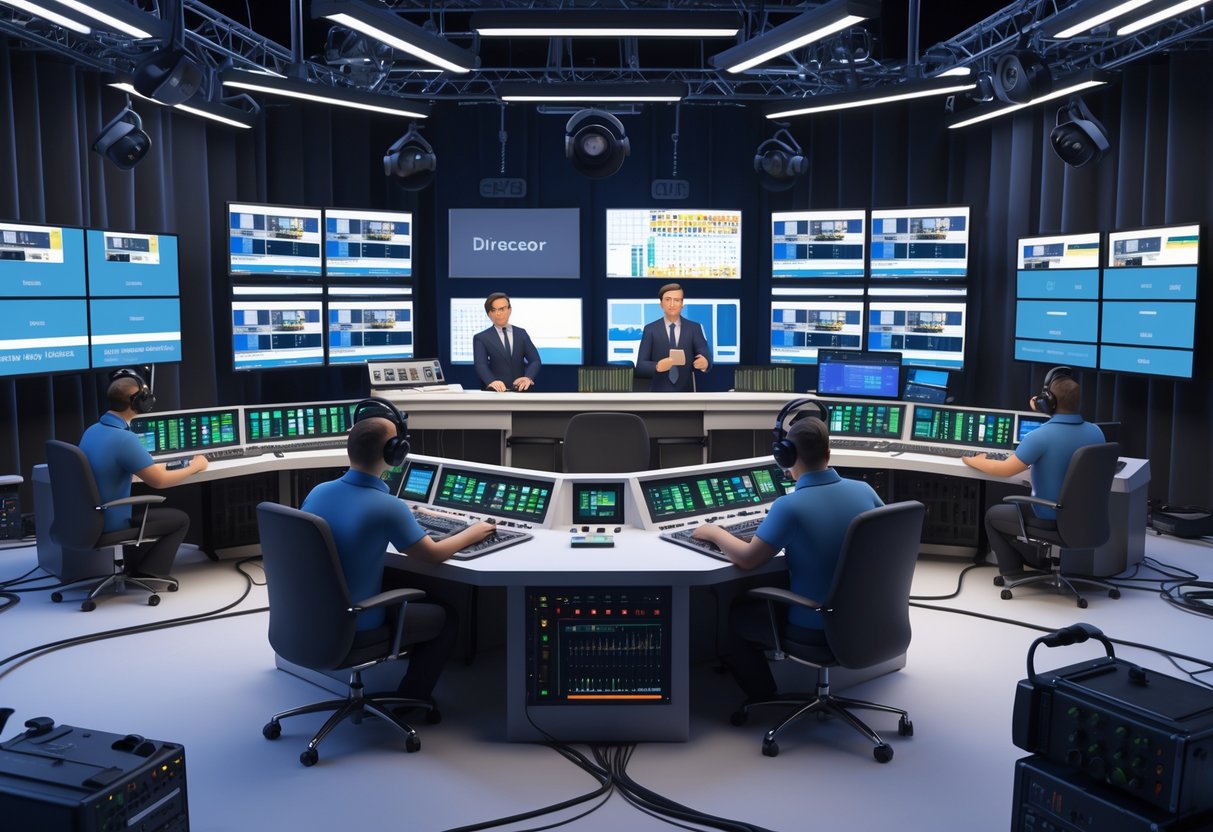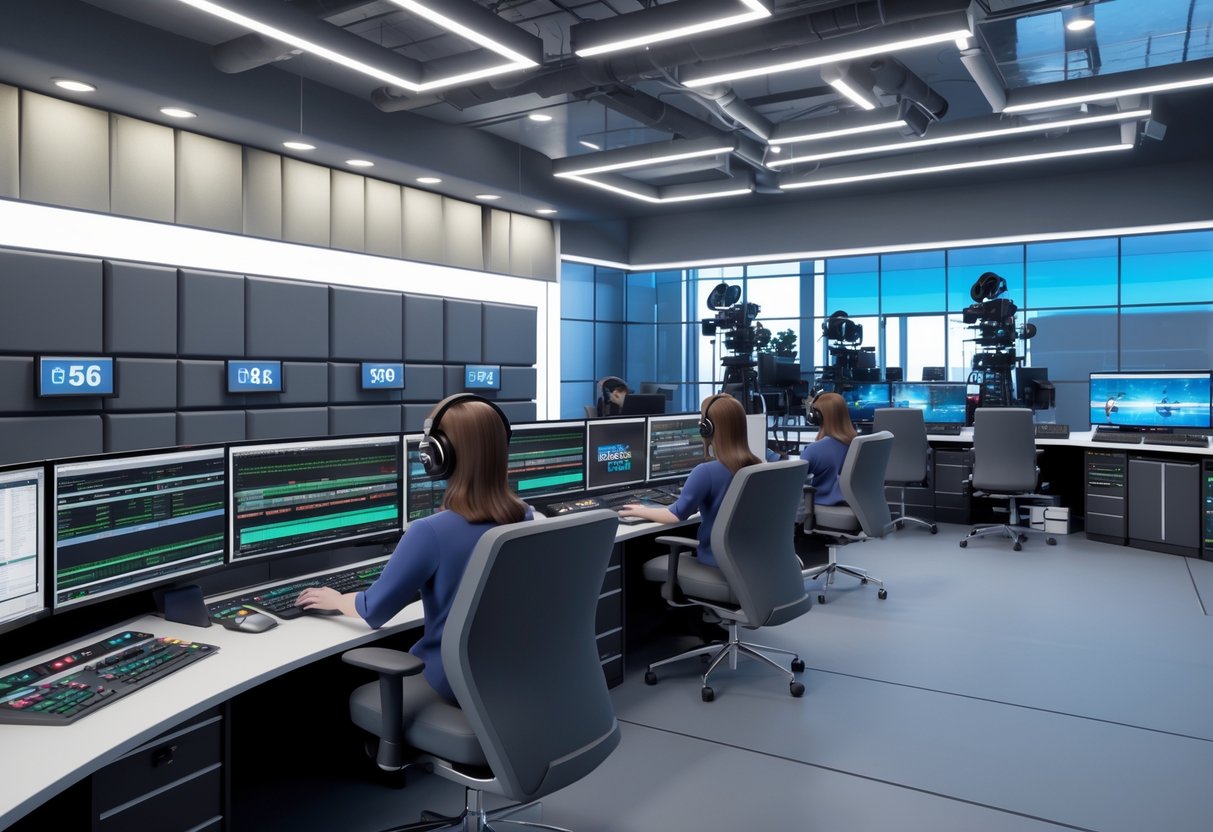Broadcast Positions: Comprehensive Guide to Roles in Broadcast Media
Updated On: November 12, 2025 by Aaron Connolly
Key Broadcast Positions and Their Responsibilities

Broadcast media depends on teams of skilled people who bring content to life for audiences. Everyone’s got their own specialty, whether that’s hosting live shows or making sure the tech doesn’t fall apart in the background.
Presenter and Anchor Roles
Presenters and anchors become the face of the programme. They read the news, host the shows, and build a direct connection with viewers and listeners.
News anchors deliver breaking news and lead current affairs shows. They react fast when things go off-script and keep their cool on live TV or radio.
Sports presenters cover live games and add commentary. They know their stuff inside out and improvise when needed.
Radio presenters usually run solo in the studio. They juggle music, interviews, and keep listeners engaged with their own style.
| Role | Primary Duties | Key Skills |
|---|---|---|
| News Anchor | Read news, conduct interviews | Clear speech, quick thinking |
| Sports Presenter | Live commentary, match analysis | Sport knowledge, energy |
| Radio Host | Music programming, listener calls | Personality, multitasking |
Most presenters rely on strong communication skills and media know-how. Honestly, experience usually trumps any fancy degree.
Producer and Director Positions
Producers and directors shape the programme’s creative direction. They work behind the scenes, planning and guiding production teams.
Producers come up with show ideas and handle the budget. They book guests, dig up stories, and keep the whole process moving from start to finish.
Directors decide what the audience actually sees on screen. They pick camera angles and direct the technical crew via headsets—sometimes it feels like orchestrating chaos.
Assistant producers help out with research and admin. It’s entry-level, but you learn a lot fast.
Directors keep their heads when the pressure’s on. They watch several camera feeds at once and constantly talk their teams through the action.
Producers usually specialize—maybe news, sport, or entertainment. Every genre has its own quirks and requires different skills.
Technical Operations Staff
Technical staff make sure the broadcast doesn’t fall apart. They handle the gear and keep the audio-visual systems running. You need technical training and a knack for solving problems here.
Camera operators capture the footage on set. They follow the director’s cues and keep shots steady and professional.
Audio engineers (A1) mix all the sound and set up microphones. They make sure everything sounds clear, even when things get hectic.
Technical directors run the video switchers and set up visual effects. They handle transitions and bring the director’s vision to the screen.
| Position | Equipment | Experience Level |
|---|---|---|
| Camera Op | Studio cameras, lenses | Entry to mid-level |
| Audio Engineer | Mixing desks, microphones | Mid to senior level |
| Graphics Operator | Character generators | Entry to mid-level |
Graphics operators create and time the on-screen graphics. They work with producers to make sure info pops up when it’s needed.
A lot of these technical jobs offer apprenticeships. Honestly, hands-on experience beats book learning in this field.
Journalists and Reporters
Broadcast journalists dig up stories, write scripts, and present the news. They work in fast-moving environments and stick to tight deadlines.
Field reporters head out of the studio to chase stories. They interview people, write scripts, and often jump on air live when news breaks.
Sports journalists cover matches, interviews, and transfer news. They build contacts with players and coaches to get the inside scoop.
Investigative reporters take their time with big stories. They go through documents, interview sources, and dig into issues that matter to communities.
Broadcast journalists need sharp writing and a good nose for news. They check facts quickly and keep things accurate, even under pressure.
A lot of journalists start at small radio stations or local TV. Building a solid portfolio helps when it’s time to move up.
News editors run the newsroom and decide which stories go on air. They assign reporters and make sure everything meets legal standards.
Production and Editorial Broadcast Positions

These roles shape what the audience actually sees and hears. People in these jobs work off-camera, create scripts, and manage the flow of information in broadcast media.
News Producers
News producers decide which stories make it to air. They choose what gets covered and how long each story runs.
Daily responsibilities include:
- Picking breaking news stories
- Working with field reporters
- Managing live timing
- Writing headlines and summaries
We stick close to camera crews and editors. Producers often start their day at 4am for morning shows. They keep an eye on news wires and social media for anything new.
Skills needed:
- Fast decision-making
- Strong writing
- Knowledge of broadcast rules
Most news producers begin as production assistants. Usually, you need a journalism or communications degree to get in the door.
Programme Editors
Programme editors turn raw footage into finished shows. They cut scenes, add graphics, and sync up the audio so everything feels polished.
We use editing software like Avid or Final Cut Pro every day. Editors work with directors to make sure the final cut matches the creative vision.
Common tasks include:
- Cutting interviews to the best soundbites
- Adding music and effects
- Smoothing out transitions
- Colour correcting footage
Deadlines drive everything. Live shows need content ready hours before air. Editors often work evenings and weekends to keep up.
Career progression:
- Junior editor (£18,000-25,000)
- Senior editor (£25,000-40,000)
- Lead editor (£40,000+)
Scriptwriters
Scriptwriters come up with what presenters say on air. They write everything from news intros to comedy bits for entertainment shows.
We dig into research before writing. Scripts have to match the presenter’s style and fit tight time slots. A 30-second intro? That’s about 75 words.
Writing responsibilities:
- News intros
- Interview questions
- Comedy for entertainment shows
- Documentary narration
Broadcast writing isn’t like print journalism. We write for people’s ears, not their eyes. Sentences stay short and simple. We break down complex info so it’s easy to follow.
Most scriptwriters have backgrounds in English, journalism, or media studies. Many start out as researchers before moving up.
Technical Support Roles in Broadcasting
Technical support teams keep everything running behind the scenes. They handle the gear, sound quality, and visuals that viewers get during live and recorded shows.
Audio Engineers
Audio engineers handle all the sound during broadcast productions. They run the mixing desks, adjust microphones, and keep the commentary clear during live events.
These folks monitor audio feeds constantly. They jump in fast when something goes wrong. Audio engineers also balance the game sounds with commentary for the best viewer experience.
Key responsibilities include:
- Running digital audio workstations
- Managing wireless mics
- Mixing commentary with game audio
- Fixing sound gear on the fly
Most audio engineers start with basic sound gear. They pick up broadcast skills on the job at production companies.
Camera Operators
Camera operators catch all the action during esports broadcasts. They control different camera angles, from wide shots of the crowd to close-ups on players.
Modern esports uses both regular cameras and special gaming capture systems. Operators switch between in-game footage and live shots without missing a beat.
Essential skills for camera operators:
- Camera control systems – Running professional broadcast cameras
- Live switching – Moving between video sources fast
- Framing techniques – Getting great shots of players and audiences
Camera operators work closely with directors to keep up with the action. They have to anticipate big moments and catch crowd reactions right when they happen.
Video Editors
Video editors put together highlight reels, promos, and post-match analysis. They work through hours of footage to create content for social media and replays.
These editors use software to splice together the best moments. They add graphics, transitions, and effects to make things pop.
Video editors often race against the clock. They have to turn around content quickly but still keep it looking sharp. Many start out as assistant editors before moving up.
Common video editing tasks:
- Making match highlights just minutes after play ends
- Adding logos and player stats
- Syncing up different camera angles for replays
- Prepping content for social media
On-Air Talent and Support Staff
Specialist broadcasting roles handle live commentary, weather, and keep programmes flowing smoothly. These jobs need strong vocal skills and the ability to keep viewers interested—even during the dull bits.
Sports Commentators
Sports commentators make live events exciting with expert analysis and play-by-play. You’ll find them on radio, TV, and streaming during tournaments.
Main duties include describing the action, giving background on players and teams, and doing interviews. They research stats ahead of time and break down complicated rules for the audience.
Most start out covering local sports or university matches. Voice training helps them last through long broadcasts. A lot of commentators begin as analysts, then move up.
| Experience Level | Typical Roles | Salary Range |
|---|---|---|
| Entry Level | Local matches, weekend coverage | £18,000-£25,000 |
| Mid Level | Regional sports, regular programmes | £25,000-£45,000 |
| Senior Level | Premier events, national coverage | £45,000-£100,000+ |
Quick tip: Try recording yourself at home to build a demo reel.
Weather Presenters
Weather presenters mix meteorology with broadcasting to deliver forecasts. We count on them for clear, engaging updates.
They work with weather data and computer models. Technical skills include reading satellite images and understanding weather patterns. Most have a meteorology degree or similar training.
Every day, they study weather maps and check in with meteorological services. They need to explain severe weather warnings clearly, especially in emergencies.
Live broadcasting means thinking on your feet when the weather shifts. They often work odd hours—early mornings, weekends, you name it.
Warning: Without both science smarts and communication skills, this job just doesn’t work.
Continuity Announcers
Continuity announcers make sure programmes flow smoothly and keep viewers informed. Their voices link shows, announce changes, and share updates.
Key responsibilities include reading credits, plugging upcoming shows, and making emergency announcements. They keep the station sounding professional and on-brand.
A lot of announcers work alone in small studios, running the audio gear while speaking live. Timing matters—they have to hit exact start times for every show.
A good voice really matters here. Announcers need clear speech and a natural delivery. Overnight shifts are common, especially when the station runs 24/7.
Training usually includes voice coaching and journalism courses. Most start out at local or specialist stations before moving up.
Digital and Online Broadcast Positions
Digital broadcast jobs blend old-school media skills with online savvy. These roles focus on making content for streaming, social, and digital-first audiences who just don’t watch TV the same way anymore.
Social Media Producers
Social media producers handle content across Twitter, Instagram, TikTok, and YouTube. They whip up short-form videos, livestreams, and interactive posts that grab audiences between traditional broadcasts.
These folks work right alongside on-air talent to take show content online. They’ll shoot behind-the-scenes clips, highlight reels, or exclusive digital content that pulls viewers back to the main broadcasts.
Key responsibilities include:
- Planning content calendars
- Managing live social media during broadcasts
- Creating graphics and short videos
- Analyzing engagement metrics
- Responding to audience comments
You need strong visual storytelling skills and a real sense for each platform’s vibe. Social media producers move fast, often posting content just minutes after something happens on air.
Entry-level jobs usually start between £18,000-£25,000. Experienced producers can pull in £30,000 or more.
Online Content Editors
Online content editors take broadcast material and reshape it for digital platforms. They edit video clips for social media, write articles for station websites, and put together podcasts or digital series.
These editors know audiences use content differently online than on TV. They cut segments shorter, add captions for silent viewing, and make sure everything works smoothly on mobile.
Daily tasks often involve:
- Editing video content for different platforms
- Writing headlines and descriptions
- Creating thumbnails and graphics
- Managing content management systems
- Coordinating with web developers
You’ll need technical skills in Adobe Creative Suite, content management systems, and some basic HTML. Knowing SEO helps content reach more people online.
Most positions ask for 2-3 years of editing experience. Salaries run from £20,000-£35,000 depending on where you work and how much you’ve done.
Podcast Producers
Podcast producers plan, record, edit, and distribute audio content for broadcasters jumping into on-demand audio. They team up with hosts to shape episode ideas, book guests, and create engaging audio.
The job blends old-school radio production with digital know-how. You’ll need to know podcast platforms, RSS feeds, and audio editing tools like Pro Tools or Adobe Audition.
Core responsibilities include:
- Pre-production planning and research
- Recording and audio editing
- Writing show notes and descriptions
- Managing podcast distribution
- Tracking download analytics
Podcast producers often handle social media promotion and cross-promotion with other shows. They usually work in smaller teams than traditional broadcast crews, so you’ll need to wear a lot of hats.
Entry-level pay starts around £16,000-£22,000. Experienced podcast producers can make £28,000-£40,000. You’ll find opportunities with big broadcasters and indie podcast networks.
Sales and Marketing Roles in Broadcasting
Broadcasting companies lean on their sales and marketing teams to bring in revenue through advertising partnerships and brand deals. These folks sell airtime, build sponsor packages, and run promotional campaigns across TV, radio, and digital.
Advertising Sales Executives
Advertising sales executives drive revenue for broadcast stations. They sell commercial airtime and digital ad space to businesses that want to reach specific audiences.
Daily responsibilities include hunting for new clients, pitching advertising packages, and negotiating contracts. Sales executives need to know audience demographics, viewing patterns, and market trends to make a strong pitch.
They build relationships with local businesses, agencies, and national brands. Strong communication skills help them explain complex advertising metrics and ROI to clients.
Most sales execs work on commission-based pay. Base salaries usually fall between £25,000 and £35,000, but successful reps can earn £50,000 or more with commissions.
You’ll need thick skin and persistence. Rejection happens a lot, and hitting monthly targets takes steady effort and follow-up calls.
Brand Partnership Managers
Brand partnership managers build long-term relationships between broadcasters and big advertisers. They put together integrated marketing solutions that go beyond regular commercials.
These managers design sponsorship packages for shows, events, and special broadcasts. Sometimes they arrange product placements, branded content, or exclusive partnership deals with major companies.
They work closely with programming teams to spot opportunities for brand integration. Partnership managers make sure deals fit the broadcaster’s image and audience.
Strategic thinking matters here. Managers need to balance the broadcaster’s content strategy with the partner’s marketing goals.
Salaries usually range from £35,000 to £55,000. Senior roles at big networks pay much more, and bonuses often tie into partnership revenue.
Marketing Coordinators
Marketing coordinators help run promotional campaigns for broadcast programming and advertiser partnerships. They handle the nuts and bolts of marketing strategies across platforms.
Core duties include managing social media accounts, organizing print ads, and setting up promotional events. Coordinators often team up with graphic designers, copywriters, and outside agencies to make marketing materials.
They track campaign results with analytics tools and report to senior marketing staff. Knowing digital marketing metrics like engagement, reach, and conversions is a must these days.
Entry-level coordinator jobs usually pay £20,000 to £28,000 a year. It’s a great place to start if you want to move up to marketing manager or brand partnership roles.
Many coordinators pick a focus like digital marketing, event planning, or audience research. Specializing can lead to better pay in broadcasting or advertising agencies.
Broadcast Management and Leadership Careers

Broadcast management and leadership jobs set the vision for radio stations, TV networks, and digital media. These roles blend hands-on know-how with business sense to oversee programming, staff management, and revenue across traditional and streaming platforms.
Station Managers
Station managers run the daily operations of radio and TV stations. They juggle everything from scheduling staff to managing budgets.
Key responsibilities include hiring presenters and production staff. They negotiate contracts with advertisers and sponsors too.
Station managers keep the station in line with broadcasting regulations and license rules.
Most station managers earn between £35,000-£65,000 a year. You’ll usually need 5-7 years of broadcast experience before stepping into management.
Essential skills are leadership and financial management. Station managers need to understand audience metrics and ratings. Strong communication helps with staff issues and advertiser meetings.
Irregular hours come with the job. Live broadcasting means technical emergencies can happen anytime. Managers stay on call for breaking news or equipment problems.
Broadcast Operations Directors
Operations directors take charge of the technical and production side of broadcasting. They manage teams in engineering, production, and content creation.
Daily tasks include coordinating live broadcasts and making sure shows transition smoothly. They supervise technical staff and keep equipment running. Operations directors also set up programme and commercial break schedules.
Required qualifications usually include a degree in broadcast journalism or media studies. Employers often want technical certifications too. Experience in production or engineering is a big plus.
Operations directors earn £45,000-£75,000 per year. Senior jobs at big networks can go above £90,000.
Critical skills include project management and technical troubleshooting. They need to know broadcasting software and automation systems. Strong organization helps them juggle multiple shows and deadlines.
Content Strategy Managers
Content strategy managers plan programming to attract target audiences. They dig into viewing data and trends to build winning content calendars.
Primary duties include researching what audiences like and what competitors air. They work with producers to create new shows and series. Content managers also negotiate for films, sports, and syndicated programmes.
Key metrics are audience ratings, demographic data, and ad revenue. They use this info to tweak schedules and content. Social media engagement and streaming numbers matter more and more.
Most content strategy managers have 3-5 years of media experience. A background in research or data analysis helps. Many hold degrees in marketing, communications, or media studies.
Salary ranges are usually £40,000-£70,000 a year. Big broadcasters or streaming platforms often pay more, and bonuses sometimes depend on ratings.
Spotlight on FOX and Fox Television Stations Careers

FOX offers loads of career opportunities across news, sports, and entertainment. The company hires for everything from entry-level to executive roles, and the benefits and growth potential are pretty solid.
Types of Positions Available at FOX
FOX television stations look for people to fill a wide range of broadcast roles. News jobs include anchors, reporters, photographers, and assignment editors. Production covers directors, producers, editors, and technical operators.
News and Editorial Roles:
- Digital journalists and multimedia producers
- Assignment editors and newscast directors
- Freelance reporters covering politics, crime, and breaking news
- News photographers and video editors
Technical Positions:
- Master control operators and studio technicians
- Video distribution engineers
- Automation directors and technical directors
- Per diem technicians for flexible scheduling
Business Operations:
- Account executives for advertising sales
- Marketing coordinators and social media managers
- Administrative assistants and traffic coordinators
- Payroll specialists and compliance managers
FOX also runs internships and trainee programmes. Creative services trainee spots offer hands-on multimedia production experience. Many jobs are based in big cities like New York, LA, Chicago, and Washington DC.
Unique Benefits of Working at Fox Television Stations
Fox Television Stations gives employees comprehensive benefits and chances to grow. People get health insurance, retirement plans, and paid time off. Career advancement programmes help staff move between departments and cities.
Professional Development:
- Cross-training in different broadcast areas
- Mentorship from experienced pros
- Access to industry conferences and workshops
- Internal job postings for moving up
Work Environment Benefits:
- Modern studios with new equipment
- Flexible schedules, including freelance and per diem work
- Remote work options for some jobs
- Collaborative teams across news, sports, and entertainment
FOX keeps facilities nationwide, so you can move for career growth. The company’s broad programming lets employees work on news, sports, and entertainment. That variety really helps you build broadcast skills that transfer anywhere.
Internships and Entry-Level Opportunities

Most people start in broadcast media with internships at local stations or big networks. These gigs give you hands-on experience in production, news, and technical roles. You’ll also meet the right people to land a full-time job later.
Typical Internship Roles in Broadcasting
Production Internships are the classic way into broadcast media. Interns work as production assistants, help with camera operations, and set up gear.
Digital marketing interns focus on social media content. They help manage online presence and create content for streaming.
News Department Roles include research assistants and field production support. Interns help journalists prep stories and assist with live broadcasts.
Technical internships cover engineering support and broadcast tech maintenance. These roles need some technical skills, but you’ll get great training.
Sports Broadcasting Internships are tough to get but worth it. Interns help with match coverage, stats research, and social media for sports shows.
Sales and business operations internships teach you the business side of broadcasting. These roles really help you understand how stations make money.
Pathways Into Broadcast Media
Traditional TV stations are still the main way in for most broadcast careers. Local stations in smaller markets—think Watertown or Binghamton—let you do a bit of everything.
Big networks like NBCUniversal and Warner Bros. Discovery run structured early career programmes. These spots are competitive, but you get to learn from industry pros.
Gray Media and similar companies offer hands-on internship programmes with real networking chances.
Public broadcasters like WETA include fellowships with their internships. These often lead to full-time jobs in educational programming.
Digital-First Approaches matter more every year. Many interns now start with podcasting or streaming before moving to traditional broadcasting.
Honestly, starting in a smaller market is smart. You’ll get more responsibility, and that experience pays off when you go after jobs in bigger cities.
Tips for Securing Broadcast Internships
Direct Station Contact usually works better than just filling out online applications. Look up local radio and TV stations, then reach out to their programme coordinators yourself.
Before you apply, try to build a strong portfolio. Throw in any video editing, writing samples, or social media work you’ve done—even if it’s just for fun or for uni projects.
Timing really matters when it comes to broadcast internships. Aim to apply about 3–4 months before you want to start, since stations often plan things well ahead.
Show that you’re genuinely interested in what they do. Watch their programmes, and if you can, mention specific shows or presenters in your application.
If you have technical skills, you’ll stand out. Learn the basics of video editing software and social media tools before you send in your application.
Go to local industry events and university career fairs. A lot of stations actually hire straight from these events instead of through formal applications.
If you can afford it, consider taking unpaid positions at first. Plenty of broadcasters started out unpaid and used that as a stepping stone to full-time work.
Essential Skills and Qualifications for Broadcast Positions

To succeed in broadcasting, you need to master technical equipment, sharpen your communication skills, and get the right education or training. Most jobs in the field expect you to mix hands-on know-how with formal qualifications.
Technical Skills
Broadcast professionals have to understand the technology behind modern media. You’ll see this everywhere, whether you’re on-air talent or working behind the scenes.
Audio and video production sit at the core of broadcast work. You should get comfortable with editing software, recording gear, and live production systems.
Most jobs want you to know:
- Digital editing platforms
- Audio mixing desks
- How to use cameras and set up lighting
- Broadcast transmission equipment
- Computer systems and databases
Live broadcast skills really set experienced folks apart. When news breaks or something technical goes wrong, you need to think fast and solve problems on the spot.
A lot of broadcasters get their start by learning basic equipment. Try out college radio, community TV, or internships at local stations to get your hands dirty.
Communication and Creative Abilities
Strong communication skills make all the difference in broadcasting. Whether you’re reading the news or interviewing guests, you need to connect with your audience.
Verbal presentation means you need good pronunciation, voice control, and the ability to read scripts so they sound natural. Many people improve these skills through practice and maybe even some voice coaching.
Writing and research support everything on-air. You’ll write scripts, dig up stories, and double-check facts before you go live.
Key communication skills include:
- Clear, easy-to-understand speech
- Good interviewing techniques
- Script writing and editing
- Engaging with people on social media
- Being able to interact with your audience
Adaptability is crucial when things don’t go as planned. Live radio and TV throw curveballs all the time, so you need to react quickly and stay professional.
Certifications and Formal Training
Most broadcast jobs want you to have formal education, but hands-on experience can sometimes count just as much. Honestly, the best approach is to combine both.
Bachelor’s degrees in journalism, communications, or broadcasting give you the basics. You’ll cover media law, ethics, production techniques, and industry standards.
Internships and work experience teach you things you just can’t learn in a classroom. Employers love to see real broadcast experience on your CV.
Other ways to keep learning include:
- Certifications in broadcast technology
- Specialised sports or news training
- Digital media courses
- Industry workshops and conferences
Some technical jobs ask for specific certifications in broadcast equipment or transmission systems. Always check what each employer needs.
Future Trends and Emerging Roles in Broadcast Media

Technology keeps shaking up broadcast media, and the pace isn’t slowing down. New job roles keep popping up, and employers want different skills than they did just a few years ago.
These digital platforms are opening doors for creative people who know how to adapt.
Impact of Digital Technology on Broadcast Careers
Digital streaming has totally changed the broadcast landscape. TV stations now need teams who get YouTube, TikTok, and podcasts as well as traditional broadcasting.
Streaming platforms are hiring creators who can make short videos for social media. These jobs blend classic broadcast skills with digital marketing.
IP-based broadcasting is taking over from old hardware. Audio engineers and technicians now need computer networking skills, not just gear know-how.
We’re seeing more remote production roles. Teams can edit and produce content from anywhere, which is great for freelancers and people who don’t want to move to big cities.
Live streaming tech has brought new technical jobs. Broadcast engineers now juggle multiple platforms—streaming to Facebook, YouTube, and TV all at once.
The rise of interactive media lets viewers join in with polls, comments, and even virtual reality. This creates work for community managers and interactive content pros.
Evolving Skill Requirements
Today’s broadcast professionals need both traditional media skills and digital savvy. Communication is still key, but the technical side keeps growing.
Video editing software is a must for almost every job. Tools like Adobe Premiere Pro and DaVinci Resolve are everywhere in newsrooms and production houses.
Data analytics help you understand your audience. You’ll need to track who’s watching, how they engage, and what works on social media.
Social media management has become part of the job. Reporters now post updates on Twitter, Instagram, and LinkedIn every day.
Multi-platform content creation means you’ll need to adapt one story for TV, radio, podcasts, and social media. Each audience wants something a little different.
Basic coding skills come in handy for managing content and using automation tools. Knowing some HTML, CSS, or how to use content management systems is a real plus.
Growth in New Media Positions
Digital changes have created job categories that didn’t even exist five years ago. Now, roles mix classic broadcasting with tech and marketing.
Podcast producers do everything from recording to getting shows onto different platforms. This role mixes audio engineering with content strategy.
Social media content creators turn broadcast content into Instagram stories, TikTok videos, and Twitter threads. They know how to cut up longer programmes for quick bites.
Audience engagement specialists handle live comments, social media, and community building. They help turn one-way broadcasts into conversations.
Content analytics managers use data to guide programming. They dig into who’s watching, what they like, and how to keep them coming back.
Virtual and augmented reality specialists build immersive experiences for news, sports, and entertainment. You’ll need both creativity and a knack for new tech in these roles.
Frequently Asked Questions

People interested in broadcast careers often wonder how to get started, where the jobs are, and what different roles actually involve. Broadcasting offers a surprising variety of paths, from entry-level gigs to specialised technical jobs in TV, radio, and digital.
How can one get started with a career in sports broadcasting?
Start by building up your sports knowledge and commentary skills. Try calling games at home while watching matches on TV. Record yourself, then listen back to spot what you could do better.
A lot of sports broadcasters begin by volunteering at local events or university matches. This gives you practical experience and something to show potential employers.
Take some courses in journalism, communications, or broadcast media. These will teach you essentials like voice training and how to use production gear.
Don’t wait for permission—create your own content. Podcasts and social channels are great places to start, especially if you focus on sports you know well.
What are the typical salaries for roles in TV broadcasting?
Entry-level TV jobs usually pay between £18,000 and £25,000 per year. Production assistants and junior researchers fall into this range.
Mid-level jobs like producers or broadcast techs earn £25,000 to £45,000. Your experience and location make a big difference.
Senior roles—programme directors or station managers—can make £45,000 to £80,000 or even more. Top presenters and anchors in big markets sometimes pull in six figures.
Freelance work is common, so income can swing a lot from month to month. Many people mix staff jobs with freelance projects to make ends meet.
Can you tell me about the various roles within a broadcasting team?
A typical broadcasting team has a handful of key roles working together. The station manager runs the daily show and sets long-term goals.
Programme directors decide what airs and when. They work with on-air talent to keep the station’s style and audience appeal on track.
Production teams handle all the technical stuff. Sound engineers, producers, and editors make sure programmes sound good and run smoothly.
Sales and marketing folks bring in money through ads and sponsorships. They also work to grow the station’s audience.
News directors and reporters focus on getting accurate, timely info out there. They dig up stories, do interviews, and present the news.
What responsibilities might one have in a radio broadcasting position?
Radio broadcasters host live shows or pre-recorded programmes for their audience. They introduce music, do interviews, and share commentary on different subjects.
Preparing for shows means researching topics, picking music, and planning out each segment. DJs often chat with listeners via phone, text, or social media.
They also run studio equipment during broadcasts. This includes controlling sound levels, playing music, and making sure everything flows smoothly.
Many radio jobs involve getting out into the community. You might attend local events, host promos, or represent the station at public gatherings.
Where could I find broadcasting job opportunities in my area?
Local radio and TV stations often post jobs on their websites and social media first. Check these directly—they sometimes list openings before bigger job boards.
Industry websites like Broadcast Now and HoldtheFrontPage regularly update with UK media jobs. These sites specialise in broadcast roles.
University career services can connect you with local stations too. Many broadcasters look for recent grads to fill entry-level spots.
Networking events and industry conferences are great for meeting people in the business. The Radio Academy and RTS (Royal Television Society) both host events around the country.
What are some good entry-level jobs for those interested in a broadcasting career?
Production assistant jobs make a great starting point in television and radio. You’ll help producers with research, scheduling, and a bunch of admin work.
Radio stations sometimes bring on part-time presenters for weekend or late-night shifts. These gigs let you get real on-air experience while the station figures out if you’re a good fit.
If you’re more into the technical side, broadcast technician roles let you work hands-on with studio equipment. Some colleges even offer courses that feed right into these jobs.
Big broadcasting companies sometimes run trainee programs for news reporting. You’ll get formal training and spend time in a real newsroom—pretty valuable if you ask me.
Promotions teams focus on community events and social media. Working here gives you a feel for audience engagement and helps you meet people in the industry.

